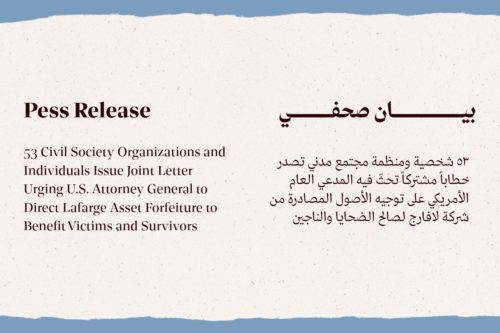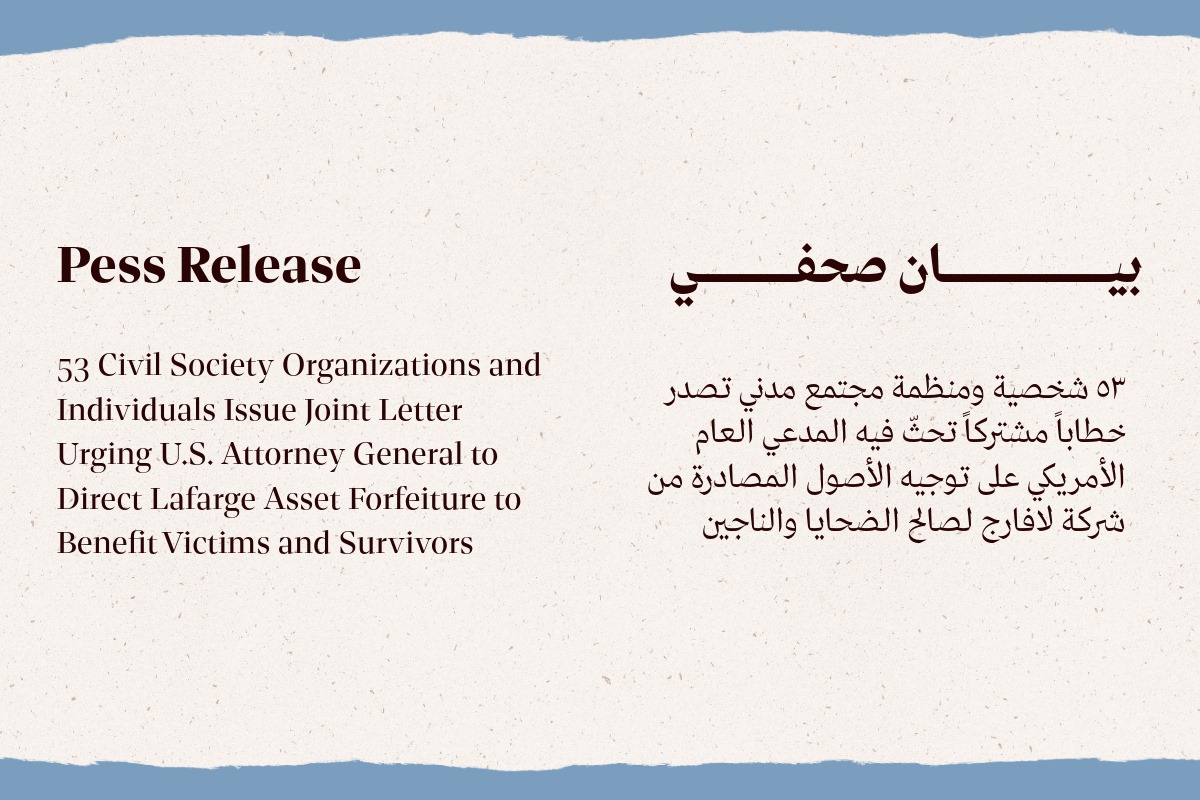53 Civil Society Organizations Issue Joint Letter Urging U.S. Attorney General to Direct Lafarge Asset Forfeiture to Benefit Victims and Survivors.

Washington, D.C. — Today The Day After, joined a coalition of 53 Syrian, Yezidi, American, and international civil society organizations in issuing an open letter urging the U.S. Department of Justice to direct funds held in the landmark criminal case against Lafarge S.A. and its Syrian subsidiary to benefit victims and survivors of serious international law violations in Syria. Victims and survivors from Syria continue to suffer the impacts of past and ongoing violations committed over the course of the thirteen-year crisis and conflict, including medical, psychological, and economic harms resulting from war crimes and crimes against humanity. While numerous States have collected significant monetary judgments linked to violations in Syria, including civil and criminal forfeitures and penalties and fines for sanctions violations, victims have rarely been able to access any remedy to address their ongoing harms. Today’s letter proposes a practical path for the U.S. Government to take action in support of survivors today, with the funds currently at their disposal.
“No government should profit from violations in Syria, including by retaining such large monetary judgments. Our letter urges the U.S. Attorney General to earmark funds forfeited in the case against Lafarge to benefit victims, and work in close partnership with civil society to identify how the U.S. Government can disburse these funds to best address the rights and needs of victims and survivors,” said Ahmed Helmi of the Ta’afi Initiative, a victim and survivor led association working with victims of torture, detention, and enforced disappearances in Syria.
The letter comes nineteen months after the French building materials manufacturer Lafarge S.A. and its Syrian subsidiary pled guilty to conspiring to provide material support to the terrorist organizations the Islamic State of Iraq and al-Sham (ISIS) and al-Nusrah Front (ANF) by making payments to continue operating a cement plant in Northern Syria from 2013 to 2014, disregarding ISIS and ANF’s well-documented rule of terror in northern Syria. The conviction marks the U.S. Justice Department’s first successful prosecution of a company for material support for terrorism, with Lafarge agreeing to forfeit $687 million. Pari Ibrahim from Free Yezidi Foundation, an organization formed in response to ISIS’s genocidal campaign against the Yezidis, noted: “The Department of Justice has given no indication on how it will use these funds, despite having the authority and discretion to direct the funds to benefit victims of these serious crimes. Our organization, which works with Yezidi community members to help them rebuild and heal from the genocide and other atrocities they endured, asks the Attorney General to apply the same creative thinking he is applying to direct forfeited Russian funds to benefit Ukraine and ensure that our communities also have pathways to recover and heal.”
The letter sets out potential pathways for disbursing the Lafarge funds to benefit the underlying victims and survivors, including through the establishment of an intergovernmental fund that would pool and disburse the U.S. and other countries’ forfeiture orders, monetary judgments, damages, fines, and penalties linked to international law violations in the conflict in Syria, as recently recommended by the European Parliament.
“Syria, Russia, and China have blocked international and domestic accountability avenues, leaving extremely limited avenues for victims and survivors to recover. The United States and other countries that support accountability for Syria should think more creatively to expand pathways for recovery. A first step could be for the United States to direct the more than $600 in ISIS-linked funds at its discretion to benefit victims and survivors.” said Joumana Seif, a Syrian lawyer and nonresident senior fellow with the Atlantic Council’s Strategic Litigation Project.
Read the full letter here.
